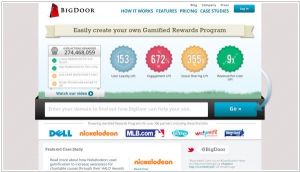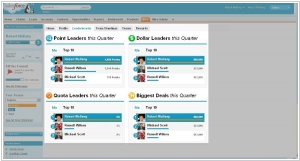BigDoor vs Bunchball
July 29, 2023 | Author: Adam Levine
8

In a world where customers are bombarded with options, brands are expected to provide engaging experiences and reward customers for their loyalty. Brands that ignore this shift in expectation won’t survive. However, brands who invest in customer loyalty will build a fan base willing to advocate on their behalf, and ultimately win. BigDoor’s products are here to help your brand build lasting customer loyalty.
4

Bunchball launched the gamification industry and generates lasting ROI with real business value by motivating people through big data. Customers, employees, and partners do more, learn more, and share more in ways that matter to your business. Now, you can harness the power of gamification to engage your audience.
BigDoor and Bunchball are both gamification platforms that help businesses engage and motivate their users through game-like elements, but there are key differences between the two:
1. Focus: Bunchball primarily focuses on enterprise solutions and employee engagement. It offers gamification tools and techniques to enhance employee productivity, collaboration, and motivation within organizations. BigDoor, on the other hand, has a broader focus and caters to a range of industries beyond the enterprise space. It provides gamification solutions for customer engagement, loyalty programs, and user retention across different sectors.
2. Features: Bunchball offers a comprehensive set of features, including badges, points, leaderboards, challenges, and progress tracking. It emphasizes driving behavior change and performance improvement within a business setting. BigDoor, on the other hand, offers similar gamification features but also provides additional capabilities such as loyalty programs, virtual currency, and social rewards, catering to a wider range of engagement scenarios.
3. Integration: Both platforms offer integration capabilities with various systems and platforms. Bunchball integrates well with HR systems, intranets, and collaboration tools to enhance employee engagement. BigDoor, being customer-centric, offers integration options with CRM systems, websites, and mobile applications to drive user engagement and loyalty.
4. Analytics and Reporting: Bunchball places a strong emphasis on data analytics and provides robust reporting capabilities to track and measure the impact of gamification efforts. BigDoor also offers analytics features, allowing businesses to gain insights into user behavior and engagement patterns, but the depth and sophistication of analytics may differ.
5. Customization: Both platforms offer customization options to tailor gamification experiences to specific needs. Bunchball provides a range of customization options and allows businesses to create tailored gamification programs. BigDoor offers a flexible and customizable platform as well, enabling businesses to design and implement gamification elements that align with their brand and user experience.
1. Focus: Bunchball primarily focuses on enterprise solutions and employee engagement. It offers gamification tools and techniques to enhance employee productivity, collaboration, and motivation within organizations. BigDoor, on the other hand, has a broader focus and caters to a range of industries beyond the enterprise space. It provides gamification solutions for customer engagement, loyalty programs, and user retention across different sectors.
2. Features: Bunchball offers a comprehensive set of features, including badges, points, leaderboards, challenges, and progress tracking. It emphasizes driving behavior change and performance improvement within a business setting. BigDoor, on the other hand, offers similar gamification features but also provides additional capabilities such as loyalty programs, virtual currency, and social rewards, catering to a wider range of engagement scenarios.
3. Integration: Both platforms offer integration capabilities with various systems and platforms. Bunchball integrates well with HR systems, intranets, and collaboration tools to enhance employee engagement. BigDoor, being customer-centric, offers integration options with CRM systems, websites, and mobile applications to drive user engagement and loyalty.
4. Analytics and Reporting: Bunchball places a strong emphasis on data analytics and provides robust reporting capabilities to track and measure the impact of gamification efforts. BigDoor also offers analytics features, allowing businesses to gain insights into user behavior and engagement patterns, but the depth and sophistication of analytics may differ.
5. Customization: Both platforms offer customization options to tailor gamification experiences to specific needs. Bunchball provides a range of customization options and allows businesses to create tailored gamification programs. BigDoor offers a flexible and customizable platform as well, enabling businesses to design and implement gamification elements that align with their brand and user experience.


